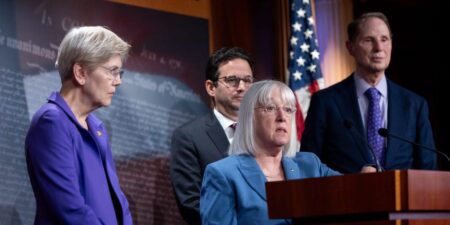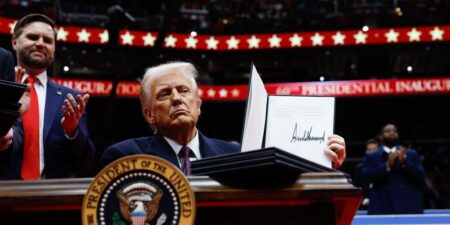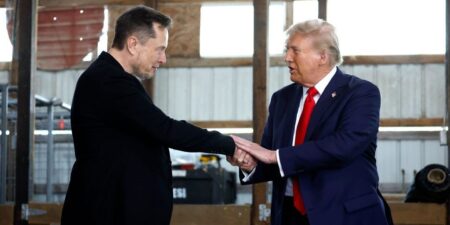- President Donald Trump’s executive orders have faced a slew of legal roadblocks.
- Judges have blocked orders on birthright citizenship, transgender inmate rehousing, and spending.
- Trump’s tariff plans for Canada and Mexico were paused after negotiations.
Some of President Donald Trump’s boldest moves during his new administration’s seismic first three weeks have been grounded before ever taking flight.
The administration and its Department of Governmental Efficiency, led by Elon Musk, the world’s richest man, promised a list of swift-moving changes to the US government’s operations. While some of those plans have progressed, others were put on hold, either in the courts or by the administration itself.
The White House says this is all part of a long game that Trump, ultimately, will win.
“Each executive order will hold up in court because every action of the Trump-Vance administration is completely lawful,” Harrison Fields, the principal White House deputy press secretary, told BI on Friday.
And as for Trump’s walked-back plans to hit our closest neighbors with tariffs — that was an all-out victory, said another White House spokesman, Kush Desai, who said Trump changed course on Mexico and Canada after “critical concessions” from both countries.
Still, much of Trump 2.0 remains on ice for now.
For those who haven’t been able to keep up with the firehouse of actions announced by the White House and DOGE, here are the key ones that have been held up — for now.
A ‘fork in the road’ resignation offer
A federal judge in Massachusetts delayed Trump’s plan to root out federal employees with buyout offers.
On January 28, the Trump administration gave just over two million government workers the chance to resign and maintain full pay and benefits until September 30. The so-called “fork in the road” resignation offer was a strategy straight out of Musk’s playbook.
US District Judge George O’Toole Jr. on Thursday extended the buyout deadline until at least Monday, just hours before the actual deadline. The order came in response to a lawsuit brought by labor union groups. A Trump administration official told BI that over 40,000 federal workers had taken the buyout as of Wednesday.
Musk’s DOGE and the Treasury
The White House launched another fiscal bombshell on February 3 when Trump told reporters he had given Treasury data access to Musk, whose DOGE is tasked with cutting government spending.
The idea that DOGE would have access to the personal information of millions of Americans — including anyone who had ever paid taxes, taken a federal loan, or collected Social Security — resulted in another legal challenge.
On Thursday, a federal judge in California set strict interim limits on the Treasury data, banning DOGE from accessing it directly.
Then, Saturday morning, another federal judge temporarily blocked a slew of people — including special government employees (like Musk), political appointees, and government employees not assigned by the Treasury — from accessing the Treasury’s payment systems. The judge also ordered those who had gained new access to the systems to destroy all copies they may have made of materials and records they downloaded.
In the order, US District Judge Paul Engelmayer cited the risk of “disclosure of sensitive and confidential information” and the “heightened risk that the systems in question will be more vulnerable than before to hacking.”
A freeze on federal spending
On January 27 — the first full Monday of Trump 2.0 — Trump budget officials dropped a bombshell memo ordering the temporary freezing of “all federal financial assistance” beginning 5 p.m. the following day, so that the spending could be reviewed. In an instant, the future of billions of dollars in federal funding was thrown into question.
The shockwaves were just as swift, even in the hours before the freeze was to take place. Medicaid portals used by states to access federal reimbursement quickly shut down across the country. Head Start funds were frozen in some states. Officials in California wondered if FEMA wildfire assistance was at risk.
Judges presiding over two hastily-drafted lawsuits issued separate injunctions blocking the freeze, including a federal judge in DC whose order came down minutes before the 5 p.m deadline.
The next day, Matthew Vaeth, director of the Office of Management and Budget, sent out a second memo. It said that the first memo is no longer in effect.
Backing off from tariff threats
Trump touted his plans to impose new 25% tariffs on imports from Canada and Mexico, and they were set to go into effect on Tuesday.
The announcements were met with retaliatory plans from both countries, where leaders said they’d enforce their own tariffs on American products.
The expected trade war rattled the markets. On Monday, stocks and crypto tumbled, while the US dollar and oil climbed.
In the end, though, these tariffs that left American investors scrambling were put on hold.
Trump and Mexico’s president, Claudia Sheinbaum, struck a deal on border policy, delaying the expected tariff on Mexican imports for 30 days. Similarly, Canadian Prime Minister Justin Trudeau negotiated a pause until March for that set of tariffs.
A similar threat of 25% tariffs on goods from Colombia was put on hold after the country agreed to accept all deportation flights from the US.
An additional 10% tariff on imports from China did go into effect Tuesday, and was quickly matched by retaliatory tariffs on US exports to that country.
Bid to end birthright citizenship
Trump’s executive order seeking to abolish the constitutional right of birthright citizenship has been indefinitely blocked by two separate federal judges.
A judge in Washington state issued a nationwide preliminary injunction against the order on Thursday, just a day after a Maryland judge did the same. The order — one of the first signed by Trump after he was sworn into office — has been challenged in the courts by more than 20 Democratic-run states and immigrant rights advocates who have argued it violates the 14th Amendment.
Judge John Coughenour of the US District Court for the Western District of Washington temporarily halted the order on January 23, calling the move to end automatic citizenship to US-born children of parents who are in the country illegally “blatantly unconstitutional.”
Coughenour issued his Thursday ruling following the decision by Maryland US District Judge Deborah Boardman. Boardman wrote that Trump’s order “conflicts with the plain language of the 14th Amendment, contradicts 125-year-old binding Supreme Court precedent, and runs counter to our nation’s 250-year history of citizenship by birth.”
Dropping USAID into the ‘wood chipper’
A federal judge on Friday temporarily blocked the Trump administration from placing 2,200 USAID employees on paid leave.
The workers, some of whom are overseas, were set to go on leave just before midnight Friday.
Musk said in an X post on Monday that he had “spent the weekend feeding USAID into the wood chipper.”
The American Federation of Government Employees and the American Foreign Service Association, however, filed a lawsuit against the administration’s USAID cuts on Thursday, arguing that the moves to dismantle it were made without congressional authorization.
Constitutional law experts told Business Insider that dismantling the agency without congressional approval is indisputably illegal.
Forcing transgender women inmates into men’s prisons
Trump’s Day One order to house transgender women into men’s men’s facilities at federal prisons has also been blocked in the courts.
The order says the attorney general and Homeland Security secretary shall “ensure that males are not detained in women’s prisons” and calls to end gender-affirming care for transgender inmates. It was challenged in two lawsuits brought by a handful of transgender women in prison.
US District Judge Royce Lamberth in Washington, DC, granted the plaintiffs’ request for a temporary restraining order on Tuesday. In his order, Lamberth wrote that the plaintiffs “have straightforwardly demonstrated that irreparable harm will follow” if the restraining order request was denied.
Lamberth’s order followed a separate ruling by US District Judge George O’Toole in Massachusetts, who also issued a temporary restraining order on January 26.
Read the full article here
















